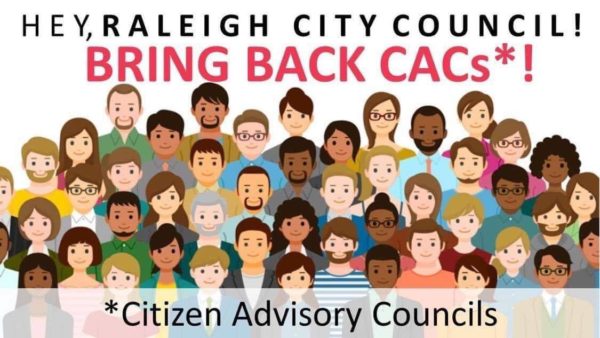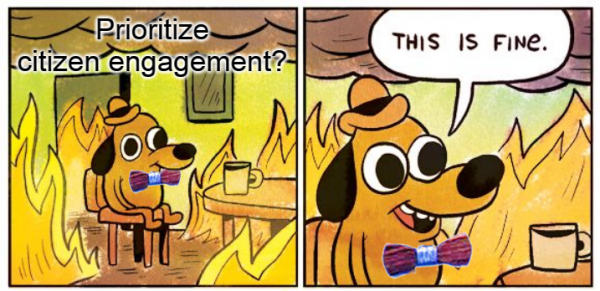At Raleigh City Council’s retreat, March 12-13, At-Large Councilor Jonathan Melton had this to say when categorizing priorities into two sets:
“I think community engagement can move into the bottom set. I don’t know that we need a one year deliverable in community engagement. I don’t think there is going to be a one shot fix to that problem. We are doing a lot already. We made it easier to speak at council meetings. We’ve added boards and commissions. Councilor Stewart and I are working on the renters issue. I don’t see community engagement as a one year deliverable.”
The problem with his explanation is that the city has been without its formal engagement process, Citizen Advisory Councils or CACs, for over a year already. At the time Melton made this statement CACs had been decoupled from the city for 402 days.
After a 10 month process to devise a new and improved system for engagement, we are no closer to any solution than we were when the CACs were defunded by this council in secret and without public notice or public comment. All we have for a 10 month consultancy is a Plan to Have a Plan.
Let’s examine Councilor Melton’s assertions:
Click on the upper right + or – to expand or collapse each topic.
"We made it easier to speak at council meetings."
Although it is true that this council eliminated the required sign-up period that existed for public comment periods at city council, that easier process went out the window when council meetings had to go “virtual.” A speaker has to sign up 4 days prior to a council meeting and have any presentation materials prepared and submitted at the time of sign-up. It is also true that speakers are supposed to be given 3 minutes to talk. But, they are regularly limited to 2 minutes and occasionally to only 1 minute. What this council has done is to limit public comment at council meetings to a maximum of 1 hour and frequently less than an hour.
Melton likes to credit this council with allowing public comments at two meetings each month while the state only requires comments at one. While this is true, it has nothing to do with any action on his part or this council’s. Raleigh City Council has held public comment periods at two monthly meetings for YEARS.
"We've added boards and commissions."
This council has added two boards. The first was the Hispanic and Immigrant Affairs Board. But, when asked by the public to create an African American Affairs Board in January 2021, they refused. Finally, when a dozen speakers asked for the fourth time at the April 6 council meeting, the request was sent to committee for review. This does NOT mean that a board will be created. But, it will finally be discussed after over three months of requests.
The second board created was the Police Advisory Board. And it is mired in controversy with the recent resignation of two of its members. Livable Raleigh praised Councilor Melton when he advocated for a more powerful board. But, nothing has come of that and the advisory board has been given even less power than state statute allows. It is true that it is illegal in NC for the board to have access to personnel records of officers or to have subpoena power over either officers or citizens. But, the board has been even further limited as stated on the city’s website: “The board will not conduct investigations, hear testimony, or contribute to disciplinary action. The board will not respond to citizen complaints. The board will not collect data.” You can read more details here: Raleigh’s police advisory board “in shambles” after two members resign.
"Councilor Stewart and I are working on the renter's issue."
Councilors Melton and Stewart have centered much of their complaint with CACs on renters. They have theorized that renters were somehow excluded from CAC meetings because those meetings, much like all city council, board and commission meetings, were held in-person, at a specified time and location and at regular intervals. To be clear many renters have attended CAC meetings and renters have been CAC Chairs. It is true that it can be difficult to reach out to renters to make them aware of CAC meetings because there isn’t easy access into multi-family residential buildings in order to distribute information. CACs asked the city for help reaching out to the community and the city routinely refused to help them with promotion.
In an effort to reach renters this council is exploring ways to notify them of the new “neighborhood meeting” for zoning cases put in place when CACs were disbanded. To date, the city is placing zoning notification signs outside multi-family residential buildings when a case is nearby and looking for ways to send notices to rental residents by mail. Both of these actions could have been taken to help CACs reach more renters.
Melton and Stewart have held one virtual meeting to gather input from renters. The meeting was sparsely attended. After accounting for council members, city staff, and CAC regulars, there were a total of 13 attendees. Two of them self-identified as renters. The councilors noted there would be a survey published on social media for those who couldn’t attend in real-time. The results of this survey have never been published and no follow-up meeting has been held.
Similarly, Councilor Stewart posted a survey on social media in the month following the disbandment of CACs in Feb 2020 asking for input on how the public wanted to engage with the city. It has been more than a year now and the results of that survey have never been published.
It is noteworthy that neither Melton nor Stewart has ever held a town-hall meeting for the general public outside of this one meeting focused on gathering input from renters.
Fuzzy meeting math
Although Councilor Melton didn’t bring it up this time, he likes to point out that when the council defunded the CACs, they added a second required neighborhood meeting to the rezoning process. What he fails to explain when he mentions this is that at least two meetings were eliminated when the CACs were removed from their formal role in the city’s rezoning process. And, those two CAC meetings were facilitated by the citizen-led CACs while the new neighborhood meeting is under the total control of the developer. A good comparison of these two processes can be found here: Council to hear from developers, not the public, on rezonings.
Councilor Melton's campaign promise on Citizen Engagement
when asked what he thought of the CACs during his campaign for council this is what he said:
“I support Citizens Advisory Councils – some of the most civically engaged citizens participate in CACs. The city council should work to more widely promote CAC meetings and explain their purpose, and to make them more welcoming to newcomers. My concern with CACs is that they are not very equitable as they exist now. Some CACs represent a larger area of residents than others. CACs have the potential to be invaluable resources to city council but only if all voices are given equal weight, and if all citizens are given equal access to have their voices heard.”
This all sounds reasonable and as though he intended to help the city promote and expand the reach of CACs. Instead, he participated in the secret plot to eliminate them without public notice. When he was challenged on his vote to dismantle the CACs instead of improving them as he promised in his campaign, he replied with this: Melton’s Flip Flop.
Livable Raleigh’s policy proposals for Citizen Engagement:
Democracy depends on residents participating in and understanding public decisions to the greatest extent possible, both directly and through their elected representatives.
- As Raleigh grows, our civic engagement practices require substantial improvement.
- The city should increase its support for Citizen Advisory Councils (CACs) and strengthen their capacity to reach, in person and online, all residents across the city. [City Council’s decision to abolish the CACs was a mistake.]
- Adopt national best practices to involve more residents and achieve more diversity among participants in all public decisions.
- Ensure that all Council and committee meetings are broadcast and/or recorded, including meetings not held in Council chambers.
Our entire Platform can be read here: Platform Statement


